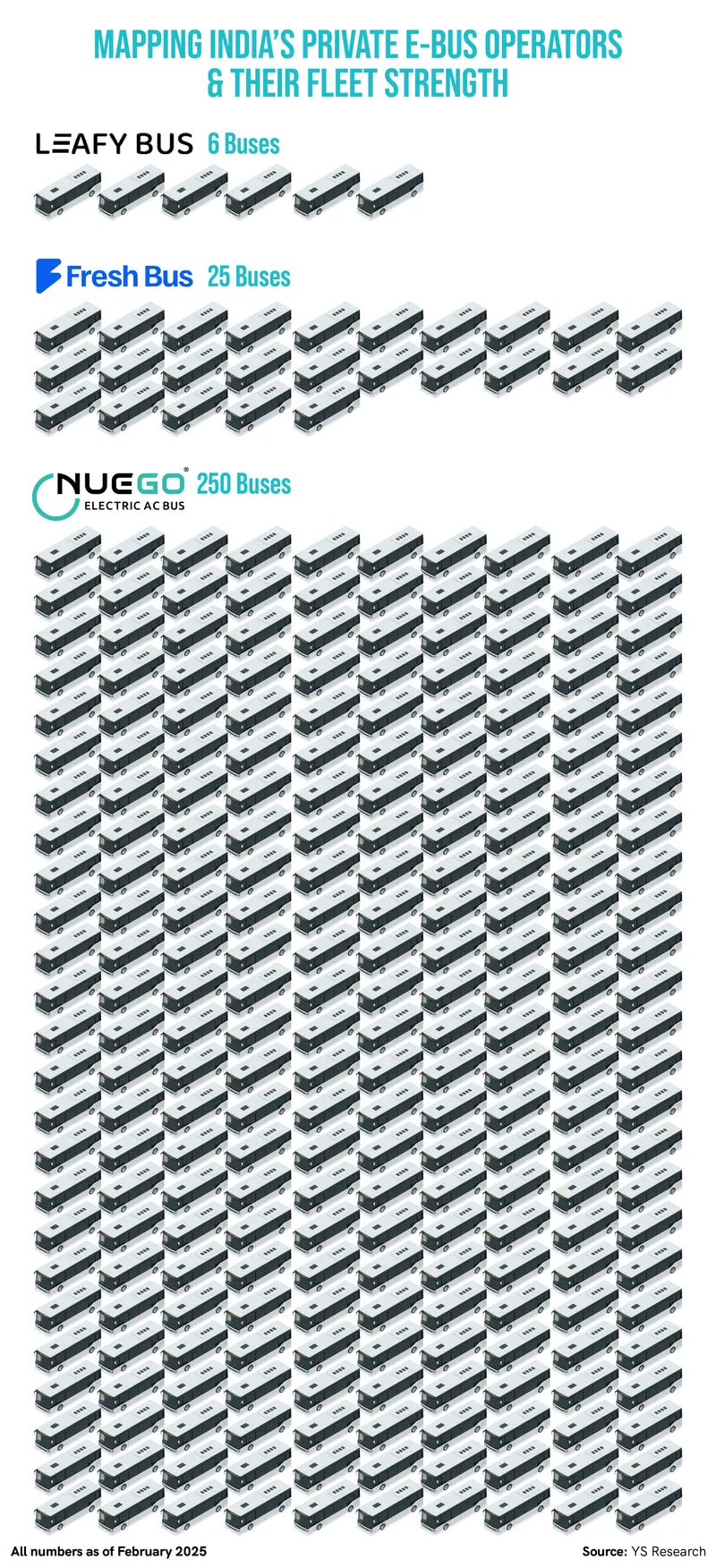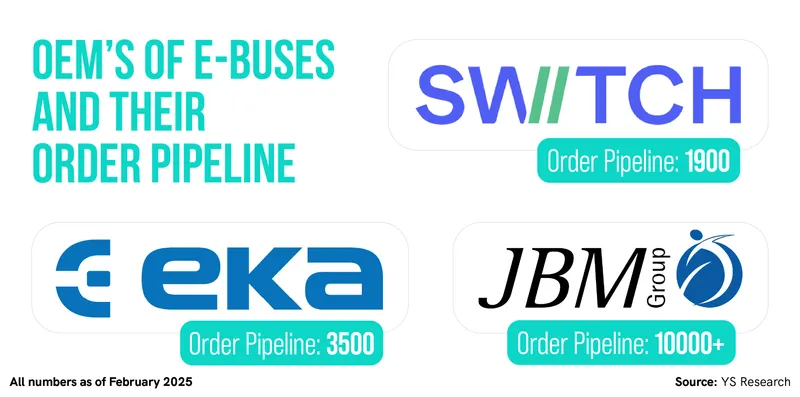Supply crunch stalls growth of private intercity electric bus operators
Industry insiders say that large government orders are flooding into the electric bus segment, resulting in delayed delivery of buses to private fleet operators.
India has an ambitious plan—electrifying its public transportation. By 2030, India aims to deploy 50,000 electric buses and ensure that 40% of buses in the country are electric.
The idea is to modernise intercity and interstate travel, curb pollution, and lower operation costs.
The regulatory push for electric buses, including programmes such as the PM e-Bus Sewa Scheme, has led to a large influx of orders for e-buses as states look to transition to green mobility.
However, with manufacturers focusing on government orders, private bus operators are losing out on this green drive.
India currently has a few original equipment manufacturers (OEMs) in the space, namely Ashok Leyland’s Switch Mobility, Greencell Mobility, and JBM Auto, among others.
The glitzy noise cancelling and tech-enabled EV buses are in demand now more than ever in the private intercity bus segment. Today, there are three main players in this segment: NueGo, FreshBus and a relatively new entrant, LeafyBus.
NueGo operates around 250 electric buses across over 110 cities in India, FreshBus operates a fleet of 25 electric buses and LeafyBus, which deployed its buses in June last year, operates six buses with plans to expand to 100 in the next 12 months.
All three players have signed agreements to roll out new buses this year, increasing their fleet size.

India’s private e-bus operators and their fleet size
Surging orders
According to reports, as of 2024, public transport authorities have placed over 20,000 e-bus orders, helped by government initiatives and other factors.
For instance, JBM Ecolife Mobility–a subsidiary of JBM Auto, recently said it has secured an order for 1,021 electric buses valued at about Rs 5,500 crore to be deployed in Gujarat, Maharashtra, and Haryana.
Another player, Switch Mobility has orders for 1900 vehicles and the company expects to deliver them in the next 18 months. Switch, unlike its peers JBM Auto and new entrant EKA Mobility, currently only focuses on business-to-government orders.
According to Switch Mobility CEO Mahesh Babu, the company is aiming to double its volumes in the coming years. “We are looking at city bus adoption close to 20-30% in the coming years and that is mainly due to central government's push on electric adoption for state transport undertaking and also some of the states like say Tamil Nadu, Karnataka, and other states, Maharashtra have found that electric buses on a Gross Cost Contract (GCC) for 12 years seems to be more viable than the current diesel numbers which are running in the market.”
GCC contracts refer to agreements between a public authority and a private operator where the latter is paid a fixed cost per kilometre for bus operations, with the public authority taking care of fare collection and service planning.
Today, while the upfront cost of operating an EV is expensive, the operational cost of running an e-bus is much less compared to an ICE (internal combustion engine) bus. In fact, most private electric bus operators today run multiple buses on a short route, helping them attain profitability on each bus faster than its diesel and petrol-run counterparts.
According to marketplace RedBus’s Chief Business Officer, Manoj Agarwala, many traditional bus fleet operators are now looking to roll out electric buses. However, Agarwala did not name the operators as the discussions have been private.
But here is where the challenges begin. Amid the rise in demand for electric buses, OEMs are reportedly struggling to satisfy government orders to now deliver buses to these private players.
“99% of huge orders are coming in (for OEMs) from the government. All the intra-city buses of the government are becoming electric. They've (OEMs) got a huge backlog with the government orders. And because of that, private players like us, are seeing higher order time,” said Rohan Dewan, Founder of LeafyBus, which currently operates in the Delhi-Dehradun route.
These government orders range between 500-7000 buses, according to Dewan.
Sudhakar Chirra, Founder and CEO at Fresh Bus echoes the same thought. “Supply is struggling to keep pace with demand, primarily due to a handful of e-bus manufacturers like JBM Auto, Olectra Greentech, Azad, and PMI Electro, among others,” he said.
There is a significant disparity in the delivery time of electric buses and ICE buses, Chirra noted. “ICE buses have a well-established production ecosystem with multiple manufacturers and an optimised supply chain, e-bus manufacturing is still in a scaling phase, leading to longer delivery timelines. ICE buses already have homologation approvals for multiple variants and types of buses and buses can be delivered 6-8 weeks from the date of order. Whereas e-buses, considering getting a new variant bus homologation approval, it could take easily from anywhere between 6 months to 1 year.”
LeafyBus said it is getting two buses every 12 to 15 days but the delivery is “very gradual” and considering they have placed an order of 200 buses, it could take a year to get the entire fleet delivered. The company had placed the order with JBM in August and began its operations with two electric buses.
However, Dewan added that new OEM entrants into the space will help ease the time gap between placing an order and receiving the units.
“So good times ahead. I mean, there is a bit of a vacuum of six months to one year. And after that, I think these new OEMs will be able to cater to any orders that come up,” Dewan added.
LeafyBus has signed up for 50 new buses with JBM Auto and (they have not disclosed the number of bus orders they have placed from EKA) buses from EKA Mobility that recently showcased their new electric bus for fleet operators at the Bharat Mobility Expo in January, this year.
However, OEMs are denying any supply shortages.
The manufacturers' POV
The intercity coach segment is rapidly gaining momentum in India for several reasons, both economical and environmental.
“The private intercity operators currently make up roughly 15%-20% of the overall bus market in India. We are closely working with various private players to provide tailored solutions, and we expect their share to grow as the ecosystem matures and financing options improve,” JBM Auto told YourStory, in an emailed statement.
However, the company added that while government orders under initiatives like FAME and PM e-Bus Seva have increased demand for OEMs, it is not necessarily slowing down supply.

Indian e-bus OEMs and their order pipeline
“The overall process from the time a policy is announced to the stage when on- ground deployment gets initiated is approximately 12-18 months. Such large-scale procurement undergoes various stages of government approvals, structured fulfilment process, product development, etc. post the policy or government scheme becoming effective,” the company added.
Currently, JBM has an order book of over 10,000 electric buses deployed and under execution.
EKA Mobility currently has an order book of close to 500 vehicles, which the company will start delivering around the end of the second quarter. These orders are primarily for its 13.5-metre and a 12-metre coach.
“Whoever is the customer, whether it is government or private, the way of dealing with these customers is different. The time taken from start to finish of the order is different but both customers are customers. The question that you are probably asking is that is there sufficient capacity? I believe that there is actually sufficient capacity,” said EKA Mobility’s Chief Growth Officer, Rohit Srivastava.
However, both JBM and EKA Mobility, said that the companies are planning to ramp up their production capacity this year, indicating growing demand in the sector.
And marketplaces like RedBus and ixigo’s AbhiBus are witnessing rising adoption and listing of electric buses on their platform.
AbhiBus has reported an 80% rise in electric bus adoption on various routes. “There are fewer EV services that run on the Indore-Bhopal route than ICE buses, but they sell way more tickets than the conventional ICE operators. So we have observed that trend shift and creation of a new market on this particular route,” said Rohit Sharma, COO at AbhiBus.
Initially, many EV operators offered tickets at discounted, introductory prices. However, marketplaces now show that most of these players have aligned their fares with standard rates—or even priced them at a premium—highlighting a natural rise in demand for electric buses on shorter routes.
Edited by Affirunisa Kankudti








